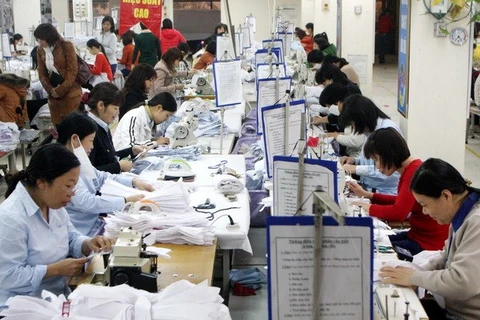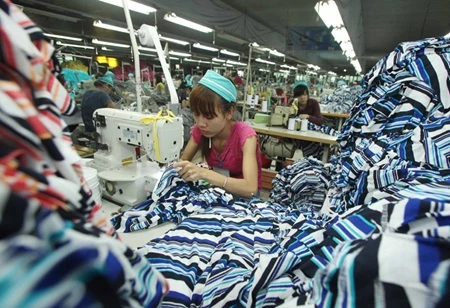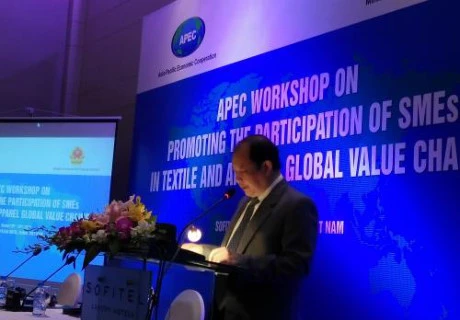 A worker operates towel-producing machines at Ha Dong-Hanosimex JSC in Ha Nam province (Source: VNA)
A worker operates towel-producing machines at Ha Dong-Hanosimex JSC in Ha Nam province (Source: VNA) Hanoi (VNA) – Vietnam’s textile and apparel sector remained passive in global value chains, said Nguyen Cam Tu, Deputy Minister of Industry and Trade, at a workshop on March 29 in Hanoi.
The workshop discussed ways to promote the participation of APEC small- and medium-sized enterprises (SMEs) of textile and apparel global value chains.
The event aims to support the deeper and more effective integration of SMEs into the APEC region, said Tu.
It also aims to enhance the participation of SMEs in global value chains (GVCs) in general and the apparel sector in particular.
The value chain follows the creation of products or services through different production phases, including physical transformation, the input of various manufacturing services, the distribution of products to consumers and their disposal after consumption, the deputy minister explained.
These activities can be conducted within the enterprises or among different enterprises of a particular geographical area.
“In fact, the GVCs are a new and more comprehensive approach to international divisions of labour,” Tu said.
“It means that any enterprise participating in the process of manufacturing can be considered to participate in the GVCs,” he added.
However, access to international divisions of labour based on GVCs would help enterprises have a better understanding of their position in the global market, and therefore they can actively select appropriate phases to maximise their benefits, he said.
It is clear that enterprises in general and SMEs in particular must actively participate in GVCs directly or indirectly, he said.
Pham Quynh Mai, Deputy Director of the Multilateral Trade Policy Department under the Ministry of Industry and Trade, did not hesitate to discuss the difficulties faced by the textile and apparel sector despite its fast growth. The sector is still depending on raw materials and materials imported form foreign countries, especially China.
“This will have a big impact on the country’s textile and apparel sector if the market has disadvantageous changes,” she said.
To access markets, enterprises need strategies and knowledge, while SMEs should sign design and outsourced manufacturing contracts with large enterprises to learn from their experiences, said Nguyen Huong Tra, a SME development expert at the workshop.-VNA























